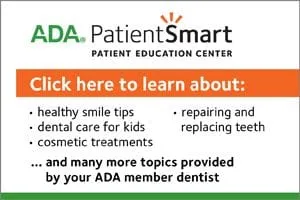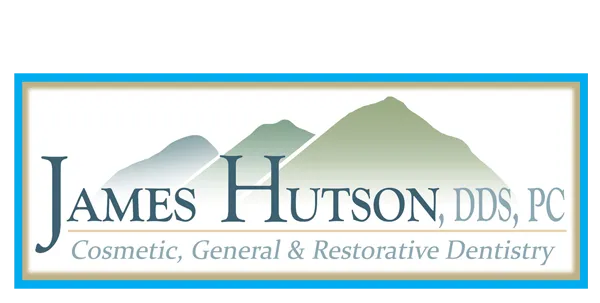Appointment Basics
Q. How often should I see a dentist?
A: The American Dental Association (ADA) guidelines recommend visiting a dentist at least twice a year for a checkup and professional cleaning. Our office also recommends a minimum of two visits per year.
Q. What should I expect during my appointment?
A: During regular follow-up visits, we will examine your teeth and gums, screen you for oral cancer, clean your teeth and make plans for treatment if needed. We will also make X-rays of your teeth and complete a TMJ (jaw joint) exam as needed. We will discuss any pain or problems you may be experiencing and answer any questions you may have.
Q. What happens if I miss an appointment?
A: If you cannot keep an appointment, please notify us immediately. With at least 24 hours notice, we are able to give your appointment to another patient who needs to see the doctor.
Q. Is it necessary to have dental X-rays taken?
A: Yes. X-rays can reveal cavities, periodontal disease, cysts, infections in the bone, position of impacted teeth and so on. These conditions are not easily detected through a normal visual exam. Early detection of such dental problems can save you time and discomfort.
Q. How should I prepare for a procedure?
A: Relax! Our highly trained staff will explain exactly what your treatment will entail and make sure you are as comfortable as possible. Many of our patients find listening to their favorite music relaxing. Therefore, we encourage you to enjoy your I-pod or music player during treatment.
Go to Top
Financial
Q. Do you take my insurance?
A: Yes. We will file with any dental insurance company, on your behalf. You are responsible for any portion your insurance company does not pay. Our office is what is commonly known as a 'Fee for Service' office. This simply means we are an independent provider of services and not in a predetermined insurance network. The Consumer Guide to Dentistry explains this concept best, "Fee for service dentistry provides people with high quality, appropriate treatment for their needs in exchange for a fair fee considering the time, care, skill, judgment and materials required to render that treatment". For more information, please read Understanding Dental Insurance by Dr. James Hutson.
Q. What is your billing procedure?
A: If you wish for us to file your insurance for you, it is important that you bring your Dental Card (which may differ from your regular Medical Card). We will only file your insurance if you present a valid insurance card. Otherwise, fees are expected to be paid at the time services are rendered. For more information, please read Understanding Dental Insurance by Dr. James Hutson.
Q. Do you offer in-office payment plans?
A: No. We do not offer payment plans in the office, meaning you do not make monthly payments to our office for your remaining balance due. As an alternative, we offer www.carecredit.com.
Q. How do I get a quote for cost of services?
A: To provide the highest level of care, an in person consultation is needed to determine your needs and treatment. We cannot quote cost over the phone.
Go to Top
Emergency Care
Q. What if I have an emergency?
A: Serious dental emergencies are those related to pain, bleeding or swelling. If you have an emergency, please call the office and we’ll make every effort to work you in as soon as possible. After office hours, you may call the regular office phone line at 770-424-7525 for instructions concerning the doctor’s emergency contact number.
Q. What are some examples of dental emergencies?
- Knocked Out Permanent Tooth:First recover the tooth, making sure to hold it by the crown (top) and not the root end. Rinse, but do not clean or handle the tooth more than necessary. Reinsert the tooth in the socket and hold it in place using a clean piece of gauze or cloth. If the tooth cannot be reinserted, carry it in a cup containing milk or water. Because time is essential, see a dentist immediately.
- Broken Tooth: Rinse the area with warm water. Put a cold compress over the facial area of the injury. Recover any broken tooth fragments. Get immediate dental attention.
- Tooth Ache: Attempt to clean around the sore tooth to displace any food trapped between the teeth. Use a warm salt water rinse. In the event of facial swelling, apply a cold compress to the area. For temporary pain relief, acetaminophen is recommended. See a dentist as soon as possible.
- Cut or Bitten Tongue, Lip or Cheek: Apply firm pressure with sterile gauze or a clean cloth. If the bleeding does not stop with pressure or continues after 15 minutes, go to an emergency room.
- Bleeding After a Baby Tooth Falls Out: Fold a piece of gauze and place it (tightly) over the bleeding area. Bite down on the gauze for 15 minutes; if bleeding continues, see a dentist.
Conditions
Q. Why are my teeth sensitive?
A: Sensitive teeth often come from the fact that your gums have slightly receded. This recession of the gum line allows the underlying dentin to show through which allows water and food easier access to the sensitive nerve. To manage this, there are a number of toothpastes, gels and even some dental procedures that can be applied. Speak to us in more detail if you have very sensitive teeth.
Q. Can my tooth pain be caused by grinding my teeth?
A: Yes, it can. Bruxism is the action of grinding your teeth or clenching your jaws. Many are bruxing while they sleep and are not even aware of it. Symptoms can include headache, sore jaw, sore teeth, chipping and wear to the teeth. Dr. Hutson can fit you with a professional grade night-guard that is worn while sleeping to protect your teeth and relieve many symptoms.
Q. What is Periodontal Disease?
A: Periodontal Disease is a quiet disease that begins with little or no symptoms. It is caused by bacteria that surrounds the teeth and enters the gums. The immediate condition is known as ‘gingivitis’. The gums become irritated, inflamed and often bleed. If not properly treated, the condition worsens with noticeable symptoms such as gum recession, abscesses, tooth pain and tooth loss.
Go to Top
Treatment
Q. Why are sealants recommended?
A: Sealants are a preventive dental treatment that protects a tooth from decay. It is a plastic material applied to the chewing surface, bonding into the grooves. It acts as a barrier to protect or seal out plaque and food.
Q. Where can I find more information about treatments and services your office offers?
A: We recommend you Schedule a Consultation with Dr. Hutson so that he may provide specialized and precise information based on your specific needs and goals. For a brief overview, see our Services page.
Go to Top
Educational Resources
Q. Have more questions about dental care and procedures?

Go to Top

